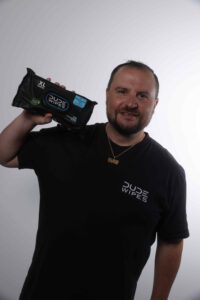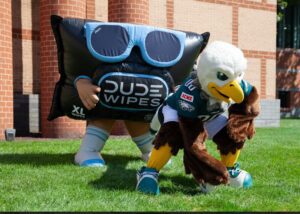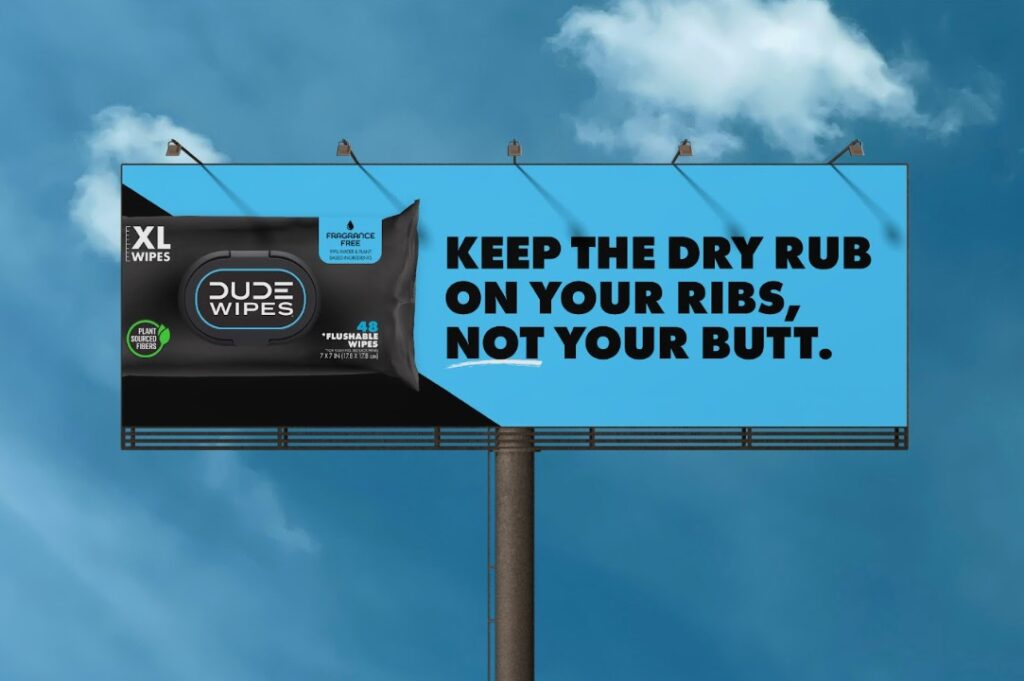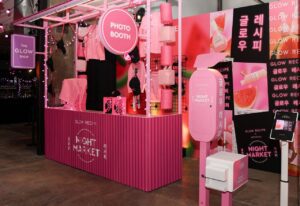Flushable wipes brand Dude Wipes shares its growth path to 10 million households, its plan for 200 events this year and its recent ‘smear’ campaign.
If you’re not into potty humor, a marketing collaboration with Dude Wipes is off the table.
The brand manufacturer of flushable wipes knows its product, audience and lane (“cheeky” bathroom humor) and ensures its marketing stays true to that, said Co-Founder and CMO Ryan Meegan.

The strategy appears to work, as the brand has steadily grown over the past 13 years and is now sold in 30,000 retail doors. Dude Wipes is on track for sales to grow 45% year over year in 2025, which would surpass more than $300 million in retail sales. Its products are in about 10 million U.S. households, which is roughly 7.6% of all U.S. households, up from 5% of households in 2024.
Besides innovative marketing (Meegan is the CMO, after all), he credits the brand’s success to its loyal customer base (35% of customers are repeat), wide channel distribution and multiple SKUs across a variety of aisles and store departments. In Walmart, for example, Dude Wipes has more than 20 SKUs across five aisles and is included with toilet paper, baby products, family needs, camping, travel and adult incontinence.
And with more revenue comes bigger marketing budgets. Since 2020, Meegan has had a “healthy eight-figure” budget to play with, compared with “low seven figures, if that,” pre-COVID.
‘Lightning strike’ marketing
While a 7.6% household penetration is respectable, the flushable wipes category is at 38% of U.S. households, Meegan said. Because of this, many of Dude Wipes’ marketing efforts are brand awareness initiatives to further drive household penetration. Meegan likes to call them “lightning strikes.”
Recently, it had a one-day “smear campaign,” on Aug. 26, which was National Toilet Paper Day. For one day, Dude Wipes purchased spots on 650 out-of-home billboards in major cities including Cincinnati, Atlanta, Fort Worth, Chicago, Bentonville, Milwaukee and Minneapolis, plus digital and social ads.
The goal was to increase brand awareness, and it did not track a return on ad spend. Meegan said the cost of the campaign was low, within six figures. Dude Wipes separates brand awareness from performance marketing budgets and goals, so it does not “lose sleep” over looking for a hard ROI and finding spikes in sales, he said.
“A one-day thing is probably not going to be a massive needle mover, but it’s just another touchpoint,” he said. “We want to keep showing up in these moments and having folks remember us for that next time they’re at the store or shopping on Amazon.”
It knows the campaign works if it sees chatter about it on social media, any earned media pickup and if employees receive feedback from it from friends and family. From those barometers, the smear campaign was a success.
Dude Wipes selected those cities for the billboards because they are headquarters to some of its major competitors. Plus, it added Bentonville and Minneapolis to showcase its marketing efforts to the Walmart and Target executives as well.
“It’s always a good thing when people in those big buildings are talking about you,” he said.
Dude Wipes leans into experiential marketing
The speed and flashiness of the campaign make it that lightning strike marketing moment. It has similar initiatives with WrestleMania, Auburn Athletics and National Football League teams, the Philadelphia Eagles and the Cleveland Browns.

At Auburn, for example, the university has a tradition of toilet papering an area of campus called Toomer’s Corner when one of the sports teams has a big win. A few times a year, Dude Wipes is sending its mascot “Deuce” to campus to distribute product samples. The message: toilet paper is for the trees, and Dude Wipes for the bathroom.
“We love being a part of cultural events and when we can immerse ourselves into a cultural event that also coincides where we can do some bathroom humor spin — and what better than toilet paper rolls and T-P-ing trees,” Meegan said.
Dude Wipes has 200 experiential marketing campaigns like these on its calendar this year, up from 20 last year.

“If we can find a cultural relevance there to the everyday fan, we like to make national news,” Meegan said. “Those fan bases are going to see it for sure. But we’re tapping into something further and bigger that we can align our brand with for a fun catchy message that’s going to be a lightning strike that resonates nationally, and that’s what we’ve been able to execute on.”
Pandemic fuels Dude Wipes’ growth
Another reason for Dude Wipes’ sales growth was an unintentional boom during the pandemic.
As most can remember, many retailers ran out of toilet paper at the start of the COVID-19 pandemic. Dude Wipes gained many customers during this time because it was literally the only product left on the shelf, Meegan said.
“People had to try us unless they wanted to use leaves,” he said.
Meegan credits its supplier with stepping up and overproducing during this time to meet the huge demand.
Once consumers tried the product, many stuck with Dude Wipes or the flushable wipe category, he said.
“75% of folks that tried flushable wipes during COVID stayed with the category,” he said. “It was a massive step change.”
‘Giving up’ on direct to consumer
When Dude Wipes launched in 2012, the trend for debuting products was to go direct-to consumer online with a subscription model. The premise of this trend (according to the brands) was that they were “cutting out the middleman” (retailers) and passing on the savings to customers. Brands hopped on this D-to-C subscription trend — even highly replenishable products, such as toothbrush brand Quip (launched in 2015), razor brand Dollar Shave Club (launched in 2011), and diaper and personal care brand The Honest Company (founded in 2012).
Dude Wipes, however, intentionally did not play heavily in the direct-to-consumer space at the early stages, Meegan said. It always knew its path to growth would be through large brick-and-mortar distribution and focused its efforts there and not on its website.
Its site did allow purchasing, but it was mainly a touchpoint with information about its brand.
“We’ll hook people — with a funny ad on paid digital — that come to our website that maybe buy once and then they go out into the ecosystem and buy where they’re comfortable buying all their toiletries at,” he said.
With the product’s heavy weight and low cost, it was not profitable to ship the item to a customer’s door. Eventually it shuttered purchasing, and now the website points shoppers to mass merchants where they can buy the products.
“We’ve never really chased it,” he said. “We gave up on it being a profit center back in probably 2018 and just use it as a marketing vehicle.”








